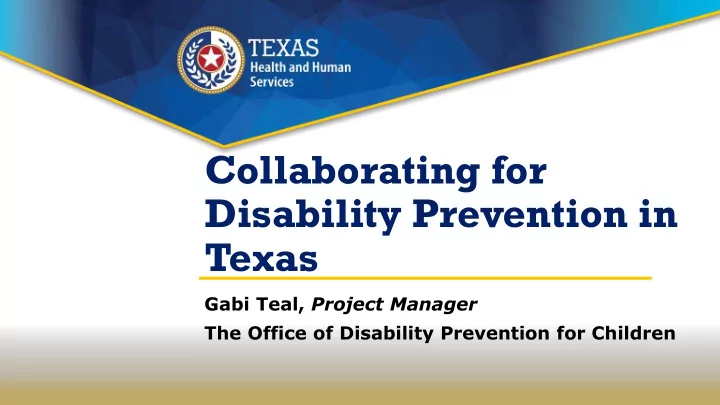

Collaborating for Disability Prevention in Texas Gabi Teal, Project Manager The Office of Disability Prevention for Children
Background • Successor to the former Texas Office for the Prevention of Developmental Disabilities • Senate Bill 200 abolished the former office and its executive committee and transferred the duties to HHSC effective Sept. 1, 2017 • The Office of Disability Prevention for Children was created in response to this legislatively mandated transfer to ensure the prevention of developmental disabilities remains a focus in Texas
Purpose and Goals ODPC strives to: • Prevent developmental disabilities in children ages 0-12 • Includes disabilities that manifest in utero and during birth • Minimize the losses caused by preventable disabilities • Coordinate a unified, comprehensive prevention effort in Texas
Developmental Disability A severe, chronic disability that is: • A mental or physical impairment, or both • Manifested before a person reaches the age of 22 • Likely to continue indefinitely And results in: • Substantial limitations in three or more major life activities • A need for a combination and sequence of special interdisciplinary or generic care, treatment, or other lifelong or extended services
Duties The Office shall: • Educate the public • Promote sound public policy • Identify, collect, and disseminate information and data • Work with appropriate divisions within the commission, state agencies, and other entities to develop a plan to monitor and reduce the incidence or severity of developmental disabilities
Duties (cont.) The Office shall: • Promote and facilitate delivery of needed prevention services • Develop, operate, and monitor programs addressing the prevention of developmental disabilities • Monitor and assess the effectiveness of the commission and state agencies in preventing developmental disabilities
Duties (cont.) The Office shall: • Facilitate coordination of state agency prevention services and activities • Encourage cooperative, comprehensive, and complementary planning among public, private, and volunteer individuals and organizations
Levels of Prevention Primary prevention • Prevent the onset of disability, aims to reduce the incidence of disability Secondary prevention • Detecting the disability in its earliest stages and intervening to slow or stop its progression Tertiary prevention • Interventions to stop or slow the progression of a disability to mitigate its negative consequences and prevents secondary conditions
Areas of Focus • Prevention of disabilities caused by prenatal alcohol and/or drug exposure • Prevention of disabilities caused by maternal health issues during pregnancy • Prevention of acquired brain injury in children • Early identification and diagnosis of disabilities to ensure early intervention and services • Address co-occurring intellectual and developmental disabilities (IDD) and mental health (MH) conditions
Co-occurring IDD/MH • Periodic workgroup meetings open to the public and other HHS programs • Email odpc@hhsc.state.tx.us for information on the next meeting. • ODPC participates in the following groups: • Mental Health Awareness Month Group • Cross-Agency Mental Health Liaison Group
Co-occurring IDD/MH • The Road to Recovery: Supporting Children with Intellectual and Developmental Disabilities Who Have Experienced Trauma • Working with the Office of Mental Health Coordination and SAFE Austin to host trainings • First Training : • When : May 8-9 from 8:30 a.m. to 4:30 p.m. • Where : Winters Public Hearing Rooms (125), 701 W. 51 st St, Austin, TX 78751 • This training is free and open to the public. • This training is full.
Environmental Scan • ODPC will be submitting a report to the legislature due Feb. 2019 • This report will include information gathered through an environmental scan and include: • Information on all things related to disability prevention in HHSC, DSHS and DFPS • Data on developmental disabilities of focus • Explanation and assessment of prevention efforts within HHSC, DSHS and DFPS • Identification of areas for improvement and recommendations
Other Projects • Social Media Presence • Website development • Training • Working on Texas Health Steps’ concussion module • Brain Injury Trainings • Speaking engagements at conferences • Developing partnerships within and outside of HHS
Partners within HHS Programs we work with include: • Early Childhood Intervention • Special Supplemental Nutrition Program for Women, Infants and Children • Prevention and Early Intervention • Healthy Texas Women and Family Planning Program • Office of Acquired Brain Injury • Intellectual and Developmental Disabilities and Behavioral Health Services
How can you help? • Meet with us to discuss shared interests • Join us for our quarterly stakeholder meetings • Recommend connections with other individuals or programs • Let your partners know we are here
Stakeholder Engagement • Next quarterly stakeholder meeting: • Monday, May 21 • 10:00 a.m. to 12:00 p.m. • Brown Heatly Public Hearing Rooms • Also via Go-to-Webinar • RSVP by May 14 at https://tinyurl.com/ODPC-5-21
Thank you odpc@hhsc.state.tx.us (512) 462-6392 hhs.texas.gov/disability-prevention
Recommend
More recommend